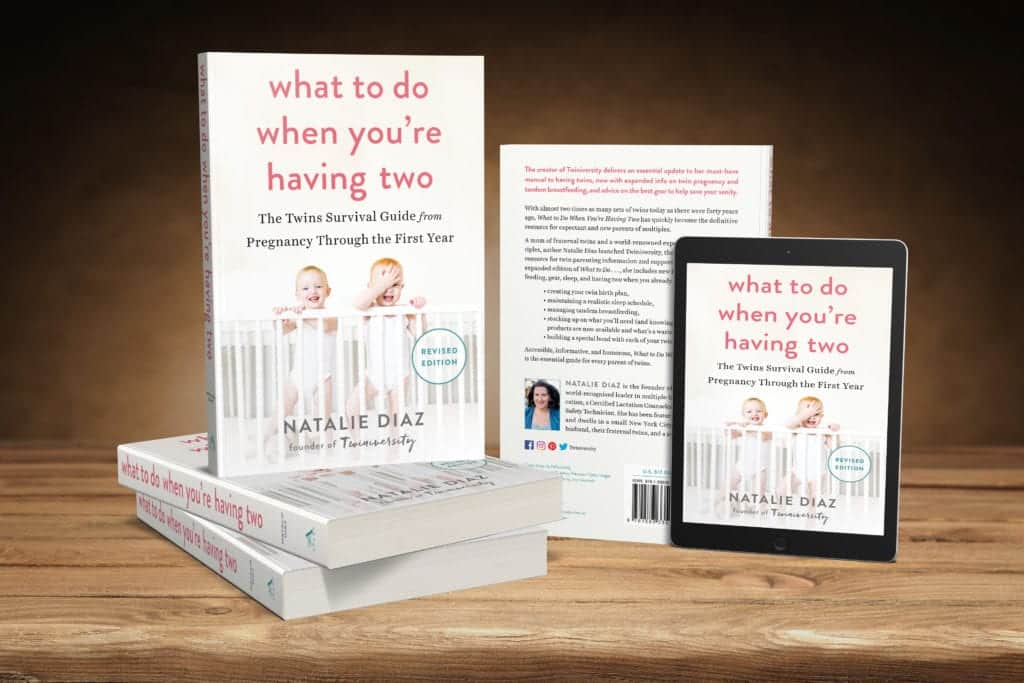Last updated on February 28th, 2024 at 06:46 pm
Learn what to expect with your infant twins 20 months old, including tips, tricks, and advice from real twin parents who have been there.
All content on this website, including medical opinion and any other health-related information, is for informational purposes only and should not be considered to be a specific diagnosis or treatment plan for any individual situation. Use of this site and the information contained herein does not create a doctor-patient relationship. Always seek the direct advice of your own doctor in connection with any questions or issues you may have regarding your own health or the health of others.
Your Twins 20 Months Old
Welcome back returning twin parents! Hello and welcome to the new twin parents who are just finding us today!
You made it through your first 19 months as a twin parent and you’re now heading into your 20th month of twin parenthood. What a huge accomplishment! Little known secret: we knew you could do it!
Now what? Well, this is a good place to start. We have plenty of information and resources to help you navigate twin parenting with your twins 20 months old.
Our twin parenting tips come from our very own experienced twin parents from around the world! These parents have all been there, done that, and are ready to share their tips and tricks with you.
This second year is full of excitement, questions, and even some anxiety. Not to worry, we’ve got your back. We’ve laid out all our best tips, tricks, and advice for twins 20 months old.
Got preemies? Make sure to consider your premature twins’ corrected age when reviewing whether or not they are meeting their milestones at appropriate times. In the vast majority of cases, preemies catch up by school-age and go on to succeed at the same level as their peers. Learn more about preemie developmental milestones here

What to Expect with Twins 20 Months Old
- Phobias and fears become increasingly common around the 20-month mark, with some (fear of dogs, for example) more rational than others (the bathtub drain).
- Around this age, they may start to play pretend games, like “feeding” a doll or “walking” a toy dog. This type of play allows toddlers to build their creativity and curiosity, and experiment with social roles that they’ll take on in the future.
- Your toddlers may be able to remove an article of clothing by herself now (or soon will be), a trick they’ll be able to show off again … and again … and again.
- Around this time, many tots drop the morning nap and transition to one afternoon nap, sleeping for about one-and-a-half to two-and-a-half hours.
- Mealtime may still seem like a struggle. Remember that your toddler’s diet is still a work in progress — not a finished masterpiece. It often takes an average of 10 to 15 tries before toddlers will accept a new food.
- At this age, children don’t have a great understanding of time — and all too often, telling your toddler to “wait” falls on deaf ears. That’s where a timer can come in handy.
- This may be the ideal time to introduce them to potty training.
- By now, you should be well aware that every twinnies are unique in their own way. The key is to be positive, practice patience and calm on an ongoing basis (as it takes work), and give your little ones ample time, attention, love and nourishment.
- If you haven’t already, look into joining a local moms of multiples club (aka twin club). Read about local twin clubs here or join our Twiniversity monthly twin club on Zoom by signing up for a Twiniversity Membership.

Want to be the first to know about giveaways, deals, and more just for twin parents? Sign up for the Twiniversity email list! Subscribe today to get emails about giveaways, events, weekly article roundups, and more! Pregnant with twins? We’ll be sending you a weekly twin pregnancy email to keep you on track with your pregnancy to-do list! Click here to learn more… and while you’re at it, check out our Complete Baby Safety Course and Twin Parent Memberships.
Common Concerns From the Moms Who Have Been There With Twins 20 Months Old
- How do I deal with double tantrums?
- How to deal with biting?
- What can I do to encourage my twins to share?
- How delayed is too delayed when it comes to twins and language?
- When should we switch from cribs to beds?

The Twins Tale Podcast by Twiniversity is an intimate look into the lives of twin parents and their twins at all ages and stages, from birth through college. We interview twin parents in the trenches and ask all the burning questions you want to know about raising twins: schedules that work, feeding your twins, getting out of the house, finding sanity, and so much more. Subscribe for FREE today!
Milestones & Developmental Leaps Parents Have Noticed With Twins 20 Months Old
What’s going on with development in twins 20 months old?
- Your twinnies can run on flat surfaces without tripping or falling.
- Without showing how, they may be able to kick a ball with forward leg motion or walk to the ball with the intention of kicking it.
- Can walk down the stairs when held by their hand. They may climb down the stairs on their own by holding the rails or the wall. They may also be able to climb up 2 or 3 stairs without holding anything.
- Since their fine motor skills are developing fast, they will show more interest in drawing and doodling.
- Can turn the pages of a book by themself (sometimes more than one at a time).
- Will be able to perform a turning motion with their fingers and wrist to unscrew a lid, open the door knob or wind up a toy.
- Can drink from a glass with little or no spillin
- Will try to imitate things you say which they find interesting.
- When shown how to, they can line up toys or objects next to each other.
- Will copy your actions like blinking of the eyes, holding the chin or tapping the nose.
- Will imitate 2-word sentences by you, like “take it”, “go up”, “stand up”, etc.
- Can say 8 to 10 words other than ‘mama’ and ‘dada’, which includes animal words and words that are uttered partially but said with intent.
Inform your doctor if your child:
- Doesn’t point to show things to others
- Can’t walk
- Doesn’t know what familiar things are for
- Doesn’t copy others
- Doesn’t gain new words
- Doesn’t have at least 6 words
- Doesn’t notice or mind when a caregiver leaves or returns
- Loses skills they once had

Challenges You Might Experience With Twins 20 Months Old
There are some challenges to look out for with twins 20 months old
- Twins escaping the cribs? It might be time to move to a bed. Read about making the switch.
- Struggling with tantrums? They are no fun! Here’s tips to handle them.
- Are your twins biting? This is a common complaint around this time. Read more about how to deal with biting here
- This is often around the time that your twins may begin fighting over toys and even you! Learn how to encourage your twins to sharing here
Tips from Parents of Twins 20 Months Old
Take some tips from experienced twin parents!
- Encourage “pretend” play. Ex. Give your twinnies a spoon so they can pretend to feed her stuffed animal. Take turns pretending.
- Give simple choices. Let your twinnies choose between two things. For example, when dressing, ask them if they want to wear the red or blue shirt.
- Expect tantrums. They are normal at this age and should become shorter and happen less often as your twins get older.
- Play with your twinnies by rolling balls back and forth, pushing toy cars, and putting blocks or other items in and out of containers.
- Use positive words and give more attention to behaviors you want to see. Give less attention to those you don’t want to see.
- Take more pictures than you think you should. They will LOVE to look at them with you soon!

Got twins? Us too! The Twiniversity Podcast with Natalie Diaz was created BY parents of twins FOR parents of twins, from your pregnancy days through your twin’s teenage years, this podcast covers it all. It’s all about parenting twins, offering plenty of strategies for making life better, parenting hacks, and, of course, humor. We are laughing WITH you every step of the way.
Feeding and Nap Schedule for Twins 20 Months Old
You’re really going to want a schedule for your twins! Be adaptable, but try to be as consistent as you can. Here is a suggested feeding and nap schedule for twins 20 months old. You will notice that milk is primarily given in addition to a meal, not used as a meal itself now.
- 7:00 am — Wake up time!
- 7:30 am — Breakfast with Milk
- 8:00 am – Playtime
- 9:30 am — Snack Time
- 11:45 am — Lunch with Milk
- 12:30 pm — Quiet Time before Nap Time
- 12:45 pm — Lights out for Afternoon Nap
- 3:15 pm — Wake up from nap
- 3:30 pm — Light Snack
- 3:45 pm — Playtime
- 5:30 pm — Dinner
- 6:30 pm — Bath and Bedtime Routine
- 7:30 pm — Lights Out
Do the best you can every day to keep them on the same feeding and sleeping schedule. When you get off track try again for the next feeding or nap.
Do everything in your power to feed your twins together to make sure you get breaks. If they are on opposite feeding schedules, you will never get a break — and you deserve one!
Are You a New Twin Parent?
Check out Natalie Diaz’s book:
“What To Do When You’re Having Two
The Twin Survival Guide From Pregnancy Through the First Year”

In What to Do When You’re Having Two: The Twins Survival Guide from Pregnancy Through the First Year, national twins guru and founder of Twiniversity (and twin mom herself!) Natalie Diaz provides a no-holds-barred resource about life with twins, from pregnancy and birth all the way through your duo’s first year of life.
Accessible and informative, What to Do When You’re Having Two
is the must-have manual for all parents of twins.
When to Call the Doctor
It’s better to overreact 100% of the time than to underreact once.
Natalie Diaz, Twiniversity Founder and Mom of Twins
All content on this website, including medical opinion and any other health-related information, is for informational purposes only and should not be considered to be a specific diagnosis or treatment plan for any individual situation. Use of this site and the information contained herein does not create a doctor-patient relationship. Always seek the direct advice of your own doctor in connection with any questions or issues you may have regarding your own health or the health of others.
When it comes to calling your doctor or seeking medical advice, you have to learn to trust yourself. If you feel something isn’t right, it probably isn’t when it comes to your twins. When in doubt, call. That’s why the offices have an answering service and staff on call at night or on the weekends.
That being said, there are a few guidelines to follow. There are a few circumstances under which you should call your doctor and get medical advice, or even call 911. When you call you should have a pen and paper handy and be prepared to give the following information over the phone:
- Immunization records
- Any medications, dosages, and times last taken (even over the counter drugs)
- Medical history
- Your baby’s temperature
- Mention that the baby is a twin, in case of a contagious illness
Any time you see the following symptoms with your twins you should contact your pediatrician immediately.
- Blood in vomit
- Blood in stool
- Seizure
- Suspected poisoning
- Bleeding you cannot stop
- Unable to move
- Limpness
- A rectal temperature of 100.4 or above
- Sleeps more than usual or will not wake up
- Yellow skin or eyes
Call your doctor as soon as possible if one or both of your twins experiences any of the following.
- Refusal to eat for multiple feedings in a row
- Diarrhea or vomiting
- A cold that will not resolve itself or gets worse
- Unexplained rash
- Signs of dehydration (no tears, no wet diapers, sunken eyes, sunken soft spot)
- Ear drainage
- Will not stop crying
When to Call 911
Please note that when you call 911, you and your baby will be taken to the nearest emergency room. This may or may not be located at your preferred hospital.
- Your baby is turning blue or taking more than 60 breaths per minute
- Your baby has a seizure which lasts more than 3 minutes or you cannot reach their doctor by phone immediately
- Suffers from convulsions, unconsciousness, or irregular breathing following a fall or from bleeding
- You think your baby may have a skull, neck, back, or pelvic fracture (DON’T move your baby)
- Your baby suffers from a compound fracture where bone is sticking out from the skin (cover it with a clean cloth and do not touch it)
- Your baby has bleeding you cannot stop after applying pressure for 10 minutes
Again, learn to trust your gut. When in doubt, call and see what your doctor thinks. Believe it or not, they’re happy to help.
What You Should Read for Twins 20 Months Old
- 10 Tips to Help Picky Eaters Get Their Nutrients
- Early Childhood Intervention: Helping Kids With Delays
- 5 Tips to Deal With Twins Fighting
- Creating a Daily Schedule for Twin Toddlers

Need some twin parent friends? Get the support you need with a Twiniversity Membership. Benefits include a monthly twin parent club meeting on Zoom, access to a private Facebook group just for twin parents, and a video library of twin parenting lessons. Visit Twiniversity.com/membership to join today!
Sources
- Dr. Ilona Bendefy, Baby: Day by Day
- Dr. Frans X. Plooij and Dr. Hetty van de Rijt, The Wonder Weeks
- Marple, Kate, and Dawn Rosenberg. “When to Call 911: How to Tell If Your Baby Needs Emergency Care.” BabyCenter
- “Newborn Baby: When to Call the Doctor.” Cleveland Clinic
- “How Often and How Much Should Your Baby Eat?” HealthyChildren.org
- “Your 20-Month-Old Child.” What to Expect
- 20 Month Old Baby Development Milestones







